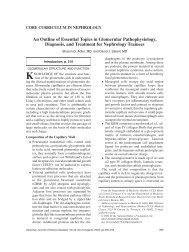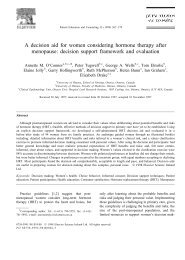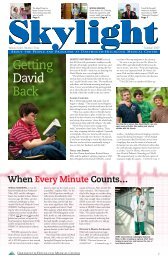Surgery and Healing in the Developing World - Dartmouth-Hitchcock
Surgery and Healing in the Developing World - Dartmouth-Hitchcock
Surgery and Healing in the Developing World - Dartmouth-Hitchcock
Create successful ePaper yourself
Turn your PDF publications into a flip-book with our unique Google optimized e-Paper software.
4<br />
20 <strong>Surgery</strong> <strong>and</strong> <strong>Heal<strong>in</strong>g</strong> <strong>in</strong> <strong>the</strong> Develop<strong>in</strong>g <strong>World</strong><br />
<strong>in</strong> both <strong>the</strong> diseases faced by <strong>the</strong> population <strong>and</strong> <strong>the</strong> levels of multiple service sophistication<br />
sought <strong>in</strong> tertiary care hospitals. Surgical services must be provided<br />
under a wide variety of technological sett<strong>in</strong>gs, <strong>and</strong> “supply<strong>in</strong>g <strong>the</strong> surgical needs of a<br />
develop<strong>in</strong>g country” has a sociopolitical connotation, for <strong>the</strong>re are many determ<strong>in</strong>ants<br />
of available medical care. Eight years ago, an estimate was made that <strong>the</strong> developed<br />
world <strong>in</strong>vested from $30 to $150 per capita per annum <strong>in</strong> surgical services,<br />
while <strong>the</strong> develop<strong>in</strong>g world <strong>in</strong>vested between $1 to $5. In <strong>the</strong> <strong>in</strong>terval, <strong>the</strong>se figures<br />
have <strong>in</strong>creased severalfold for <strong>the</strong> developed world, but for <strong>the</strong> develop<strong>in</strong>g world <strong>the</strong><br />
data have rema<strong>in</strong>ed unchanged <strong>and</strong> <strong>in</strong> some places have even dim<strong>in</strong>ished! As a means<br />
of <strong>in</strong>creas<strong>in</strong>g health coverage, especially <strong>in</strong> rural areas, priority <strong>in</strong>vestment <strong>in</strong> primary<br />
health care, <strong>in</strong>clud<strong>in</strong>g some fundamental surgical tasks, may be placed <strong>in</strong> <strong>the</strong><br />
h<strong>and</strong>s of paramedical personnel.<br />
The development of health care <strong>in</strong> <strong>in</strong>dustrialized nations may be viewed <strong>in</strong> three<br />
stages. Challenges to public health <strong>and</strong> personal health services provided can be<br />
classified <strong>in</strong> <strong>the</strong> first stage as that of <strong>in</strong>fectious diseases, malnutrition, <strong>and</strong> poor hous<strong>in</strong>g.<br />
The second stage is that of chronic diseases, such as cardiovascular <strong>and</strong> cerebrovascular<br />
disease <strong>and</strong> cancer; <strong>and</strong> <strong>the</strong> third stage is that of social environmental<br />
pathology—<strong>in</strong>clud<strong>in</strong>g accidents, alcoholism <strong>and</strong> o<strong>the</strong>r addictions, overnutrition,<br />
<strong>and</strong> associated morbidity of each.<br />
If socioeconomic development <strong>and</strong> well-be<strong>in</strong>g result <strong>in</strong> average life expectancies<br />
that approach <strong>the</strong> maximum life span, acute illnesses have ceased to be a major<br />
medical problem <strong>and</strong> have been replaced by chronic illness. This development implies<br />
that <strong>the</strong> practical focus on health improvement must be on morbidity, not<br />
mortality, for natural death will occur near <strong>the</strong> maximum life span. The problem to<br />
be addressed is how to improve <strong>the</strong> quality of life through <strong>the</strong> compression of morbidity.<br />
Eventually, <strong>the</strong> current limits to longevity are societal, not medical, problems.<br />
Medical care systems <strong>in</strong> <strong>in</strong>dustrialized western societies are largely constra<strong>in</strong>ed<br />
to improv<strong>in</strong>g <strong>the</strong> quality of life. Develop<strong>in</strong>g countries face a challenge of cop<strong>in</strong>g<br />
simultaneously with all three stages, with just a fraction of <strong>the</strong> human <strong>and</strong> material<br />
resources available to <strong>the</strong>ir <strong>in</strong>dustrialized counterparts.<br />
The epidemiology of surgical disease is characterized by <strong>the</strong> same three stages.<br />
But <strong>in</strong> develop<strong>in</strong>g countries <strong>the</strong>re are unique complications that result from poverty,<br />
illiteracy, malnutrition, tropical <strong>in</strong>fectious disorders, <strong>and</strong> abysmal limitations of laboratory<br />
<strong>and</strong> diagnostic equipment <strong>and</strong> hospital facilities. At least one component of<br />
this situation is scarcity of scientific <strong>in</strong>formation <strong>in</strong> libraries or access to <strong>in</strong>ternational<br />
databases.<br />
In addition, <strong>the</strong>re are major differences <strong>in</strong> regional cl<strong>in</strong>ical pathology. For example,<br />
<strong>in</strong> a temperate climate a low-grade <strong>in</strong>creas<strong>in</strong>g colonic obstruction <strong>in</strong> an adult<br />
is most likely to be a carc<strong>in</strong>oma; this is not necessarily <strong>the</strong> case <strong>in</strong> a tropical climate,<br />
where amoébic dysentery <strong>and</strong> schistosomiasis are prevalent. This difference is significant<br />
because <strong>the</strong> carc<strong>in</strong>oma should be operated upon; with ameboma of <strong>the</strong><br />
colon, <strong>the</strong> condition does not require surgery unless an emergency arises s<strong>in</strong>ce effective<br />
treatment is available through nonoperative means. As a consequence, chronic<br />
gut obstruction <strong>in</strong> one area of <strong>the</strong> world or ano<strong>the</strong>r should be <strong>in</strong>vestigated for different<br />
diseases with different treatments, <strong>and</strong> <strong>the</strong> m<strong>in</strong>d-set fostered by cl<strong>in</strong>ical education<br />
would be different <strong>in</strong> different areas. “Geographic surgery” would focus on <strong>the</strong><br />
circumstances <strong>and</strong> disorders unique to a given area that merit dist<strong>in</strong>ct emphasis.










